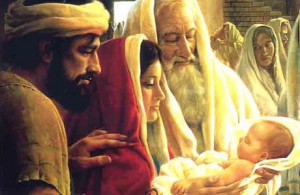Bonjour / Hello [nickname_else_first_name],
Table of contents
1) Perashat Hashavoua - Rabbi Eli Mansour
2) Halakhat Hashavoua - Chazzan David Azerad -
Four Mitzvot concerning the prohibition of ḥametz - Peninei Halacha
3) Holy Jokes!
4) FOR KIDS!

This Week's Parasha Insight with Rabbi Eli Mansour
Parashat Tazria: Eliyahu Ha’nabi and the Berit Mila “Redemption”
Parashat Tazria begins with the law of "Tum’at Yoledet" – the state of impurity that descends upon a woman after she delivers a child. The Torah establishes that the woman is impure for either seven or fourteen days – depending on whether she delivers a boy or a girl – and she is later required to offer a special sacrifice to regain her status of purity.
This Halacha seems, at first glance, very difficult to understand. The very first Misva that G-d commanded after creating the first human beings is "Peru U’rebu" – the obligation to procreate. Having a child is something precious and beautiful. It is one of our most sacred duties. Why, then, would childbirth bring upon a woman a state of Tum’a (impurity)? In fact, the Gemara tells that Hashem has a "container" in the heavens containing all the souls destined to come down into our world, and once this container is empty, Mashiah will come. As such, every time a woman delivers a child, she brings the world closer to its state of redemption. For what reason, then, does she become impure?
Another seemingly peculiar aspect of the Torah’s discussion of "Tum’at Yoledet" is the mention of the Misva of Berit Mila in this context. As it discusses the case of the birth of a boy, the Torah found it necessary to reiterate the command to circumcise the child on his eighth day. Why is this Misva repeated here? Of what relevance is Berit Mila to the Halacha of "Tum’at Yoledet"?
The answer lies in an understanding of the concept of Tum’a. This word does not, as many people mistakenly believe, refer to "contamination," or any sort of filth. Rather, as the Zohar teaches, Tum’ah is the result of lost sanctity. When something is filled with Kedusha, and then that Kedusha is lost, the forces of impurity fill the vacuum that is created. A number of sources draw a comparison to two jars – one that contained honey, and another that contained vinegar, which were emptied. Not soon afterward, insects and flies descended upon the empty honey jar to consume the sweet drops of honey that remain, but no insects go to the vinegar jar. Similarly, as long as a soul is in the body, the Kedusha of the soul keeps the "insects" – the forces of Tum’a – away, but once the body is "emptied," the vacuum is filled by these forces that seek to feed off the "sweetness" of the residual Kedusha which remains. These forces go only to where there was "honey" – Kedusha – but not to where there was "vinegar." They are attracted to the "sweetness" of Kedusha, and are able to descend upon a holy place once the Kedusha is no longer present.
In other words, Tum’a is what happens when Kedusha departs.
This, then, explains the concept of "Tum’at Yoledet," the state of impurity that befalls a woman after childbirth. The Gemara famously tells us that during pregnancy, an angel sits with the fetus and teaches the child the entire Torah. Remarkably, a woman during pregnancy is a "mobile yeshiva," with Torah being studied inside her. There is great Kedusha inside the woman during those months. Once the child is born, this Kedusha is lost, and the void is filled by the forces of impurity.
Extending this notion further, we can explain why the period of Tum’a is longer after the birth of a girl than after the birth of a boy.
The primary difference between the birth of a girl and the birth of a boy is that after the birth of a boy, there is a Berit Mila – and the Berit Mila has the effect of eliminating the woman’s state of Tum’a.
Tradition teaches that Eliyahu Ha’nabi attends every Berit performed on a Jewish child. And, as we know, Eliyahu is going to be sent to us before the arrival of Mashiah in order to prepare us for redemption. He will inspire, motivate and guide us to repent, to eliminate all our "impurities," and draw closer to Hashem so we will be ready to greet Mashiah. Eliyahu attends a Berit because a Berit is what we might call a "miniature redemption." A Berit Mila is a moment of immense Kedusha, an occasion that brings a level of purity and holiness to all those who are in attendance – resembling, in small measure, the purity and holiness that Eliyahu will help us achieve when he will arrive to prepare us for the final redemption.
Naturally, then, the period of Tum’a that follows childbirth ends after seven days – because at that point, the child is circumcised, and Eliyahu arrives and eliminates the impurity. And this is why the Torah mentions Berit Mila in this context – because it is the reason why the period of Tum’a after the birth of a boy ends after only seven days. The Torah is indicating to us that the occasion of a Berit has a profound spiritual impact which rids the woman of her state of Tum’a – giving us a glimpse of the spiritual elevation that we will experience in the future, when Eliyahu comes to prepare us for Mashiah, speedily and in our days, Amen.

Four Mitzvot concerning the prohibition of ḥametz - Peninei Halacha
Four Torah commandments deal with the prohibition against ḥametz on Pesaḥ: three negative and one positive.
The first prohibition is to refrain from eating ḥametz, as it is written, “And ḥametz shall not be eaten” (Shemot 13:3). Our Sages taught that the prohibition against eating ḥametz on Pesaḥ includes not deriving any kind of benefit from the ḥametz. The Torah further states: “You shall not eat any leavened product (maḥmetzet)” (Shemot 12:20). Our Sages concluded from this verse that not only something that had fermented on its own is prohibited, but even food that had been leavened by some external agent may not be eaten on Pesaḥ. It must be noted that the Torah was particularly stringent concerning the prohibition against eating ḥametz. Almost all of the Torah’s food prohibitions are punishable by lashes, while eating ḥametz on Pesaḥ is punishable by karet (extirpation), as it is written, “whoever eats ḥametz from the first day until the seventh day, that soul shall be cut off from Israel” (Shemot 12:15).
The second prohibition is that no ḥametz may be found in our possession, as it is written, “Seven days there shall be no se’or found in your homes” (Shemot 12:19). Se’or is the “starter” or leavening agent used to make dough ferment. This verse means not only that se’or is forbidden, but also that no ḥametz may be found in our possession. This prohibition is often called bal yimatzei.
The third prohibition is that no ḥametz may be seen in our possession, as it is written: “Matzot shall be eaten seven days; and no ḥametz of yours shall be seen, and no se’or of yours shall be seen within all your borders'' (Shemot 13:7). One violates the second prohibition (bal yimatzei) and this third prohibition (called bal yera’eh) only if one has in his possession on Pesaḥ at least one olive’s bulk (kezayit) of ḥametz. If the volume of the ḥametz that remained in one’s possession was less than a kezayit, he does not violate bal yera’eh and bal yimatzei on account of that ḥametz.
The fourth mitzvah – a positive commandment – is to eliminate ḥametz and se’or in advance of Pesaḥ, as it is written, “Seven days you shall eat matzot; however, on the first day you shall remove the se’or from your houses” (Shemot 12:15).
Bevirkat Shabbat Shalom Umevorach
David Azerad
4) FOR KIDS
Click on the image to open the youtube video












